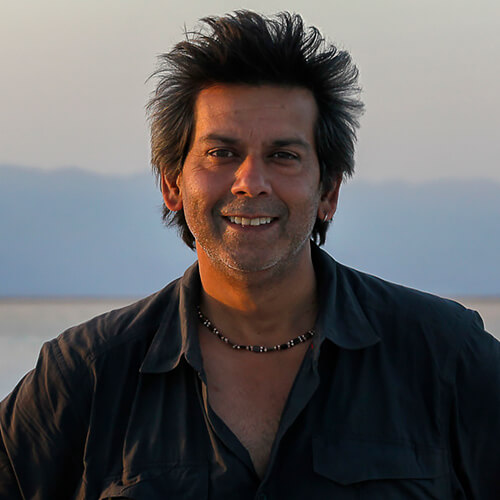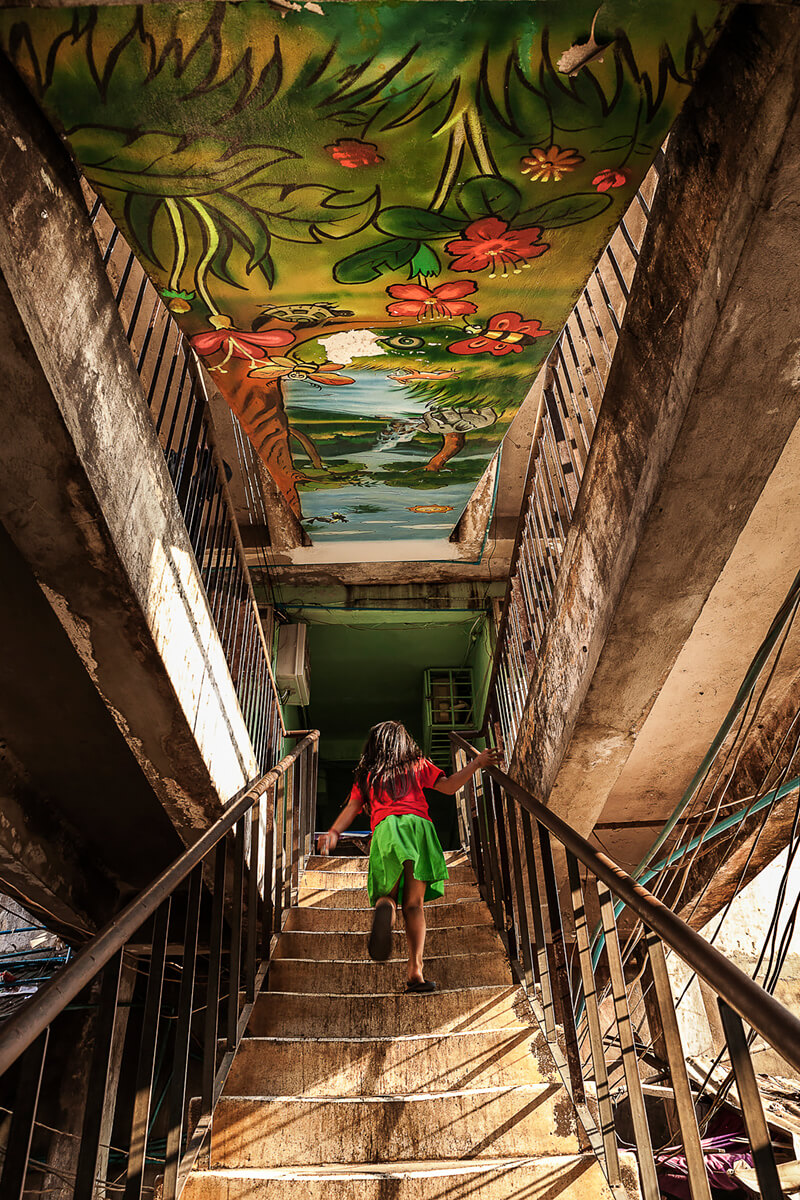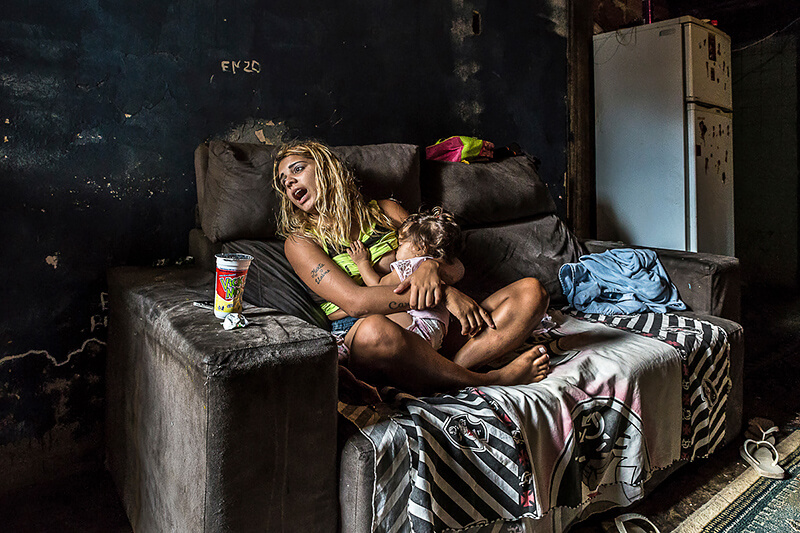All About Photo: First of all, congratulations for being All About Photo's 2018 Photographer of the Year! Could you tell us what was the determining factor in submitting your work for this specific contest?
Tariq Zaidi: Thank you. I am extremely humbled and very honored to have been awarded All About Photo's 2018 Photographer of the Year. Thank you, AAP and the Jury panel for recognizing my work.
The work I submitted was half from my recent 2017 reportage work from Brazil, Congo and North Korea – together with other images from travels before which may be considered more as travel photography – hoping to provide the Jury with a balanced overview of my work.
In 2014 you gave up a senior corporate position to become a full time photographer. What triggered this decision?
After almost 20 years in business/corporate world - I was so tired of the corporate environment, it was just killing me and I felt like I was going to die if I kept doing this, I need to live, do what I love and give it a shot.
A friend of mine who is a professional photographer, who is very successful said to me 'Do you know how hard it is to become a professional photographer? Because just in London alone there are something like 22,000 photographers who are trying to make a living, you are just not going to make it, it's just so hard. Before you quit your job make sure you have enough money to somehow survive for the next three to five years because you are not going to get anywhere for at least 5 years and that's if you are damm good & lucky'. You know what, I just said 'perfect' I love that challenge and I'm going to go for it irrespective of what you say. I set myself targets and financial budgets, like I can only spend this much this year as I need to buy a computer, I need to buy software, I need to buy a camera, it all costs a lot of upfront money. I knew I needed to sell my photographs so at least I'm not losing money. The last thing I wanted to do is lose a job I can probably never go back to and get into debt. I wanted to make it a successful business and my idea of success was not losing money for the next five years.
I was very lucky, I had a tremendous amount of success for a beginner in my first year. I was involved in multiple assignments, I was lucky enough at that time to be teaching, people were buying my photographs, I was getting published and things just flew! Even though my target for year one was not too loose money, I actually made some money, enough to try another year and then another and well, here we are now.
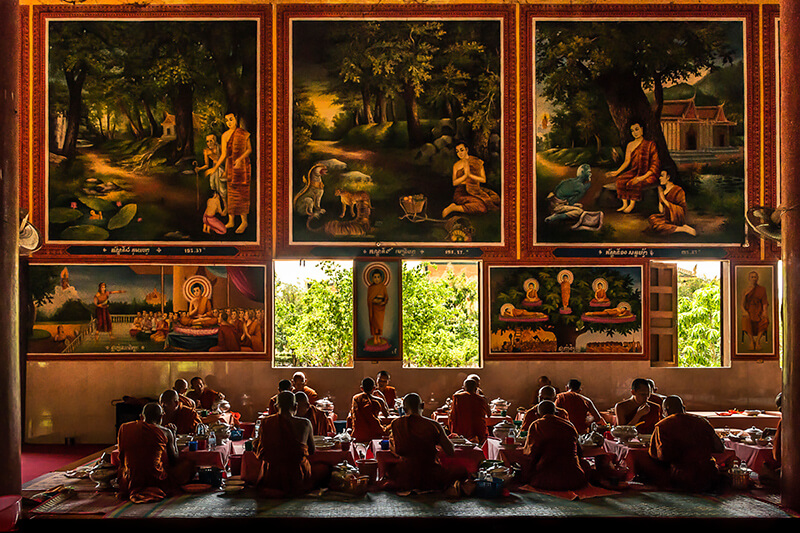
© Tariq Zaidi - Oudong Buddhist Monastery
Monks having lunch in Oudong buddhist monastery (Vipassana Dhura Buddhist Centre), Cambodia.
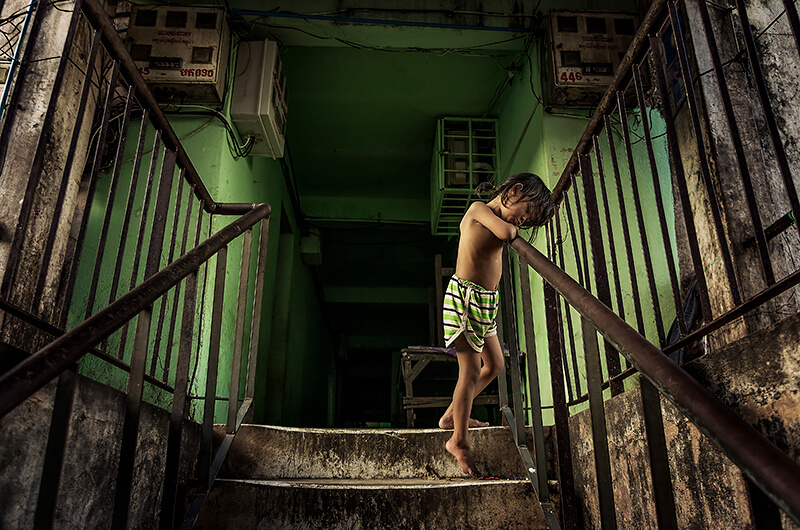
© Tariq Zaidi - There's No Place Like Home
A resident at the White Building. PhnomPenh, Cambodia. The White Building (called Bodeng locally), was a huge, iconic 1960's apartment block in central Phnom Penh, earlier this year (Aug 2017) the building was demolished to make way for new modern living and office spaces. The multiple apartment block was built to house artists and low-income workers in the time of Cambodian urbanisation in early '60s. It was a place of creativity, inspiration and extremes.
What was your biggest challenge in changing careers? How did you manage to obtain assignments?
This is a great question and I would love to give a workshop on the answer.
There is a tremendous amount which happens before any image is taken and after you get back.
Pre-travel – includes research, research, research, logistics, budgeting, fees negotiation, understanding needs of your client etc.
And post travel – includes editing, sequencing, post production, more research, captioning, story writing, sales, social media announcements, more meetings and sales.
The easiest and most pleasurable part for me is actually taking the images. Though as a percentage of time spent it is where the least amount of time is actually spent.
You travelled in many countries, did you finance your trips at the beginning?
Yes, and I still do as a lot of my personal work is self-financed. I set myself a budget for each trip and make sure all my costs are controlled within that budget.
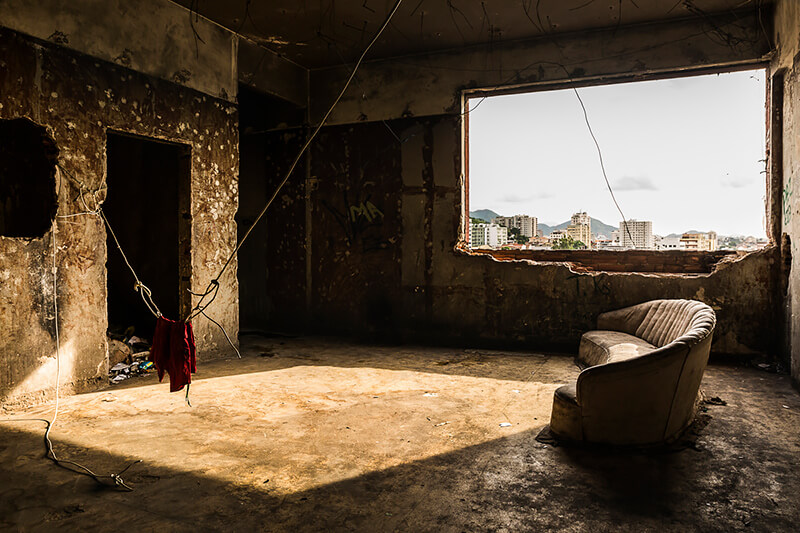
© Tariq Zaidi - Favela Shorts
Washing hangs in one of the corridors of the IBGE (Brazilian Institute of Geography and Statistics) building, an occupied squat of around 100 families. Favela Mangueira community, Rio de Janeiro, Brazil.
How do you choose your subjects? Is it a long process?
Research. I find out what has already been done and figure what I am going to do differently. I spend a hell of a lot of time researching what is out there already: about the countries, the people and the subject matter I want to tackle. Logistics cannot be overlooked, especially when overseas. Everything will likely change when you are there, but it's good to have a thought, an idea, a dream in your mind before you head out.
What country/people touched you the most?
Africa, as many parts are not photographed. It's also physically challenging. A lot of places I go to in Africa, its sleeping in tents, there's no water, there are no toilets, you are out in the middle of nowhere. But, the people you meet, the environment and generally the images that come out of that environment can be amazing.
This is what I love to do, try and take pictures of people in environments that are not that well documented. Another reason is that I am drawn to disappearing cultures, environments, people whose cultures are fighting to survive with modernity all around.
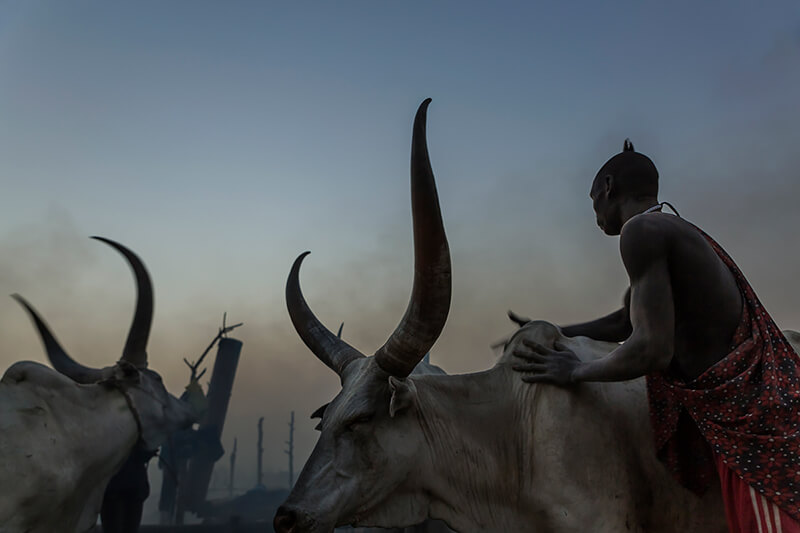
© Tariq Zaidi - A Mundari man washes his cows with ash to protect them from insects during the night, South Sudan.
I am currently engaged on a project covering 6 to 8 countries. My work forms part of a long-term personal project to develop a visual anthology capturing the human spirit across some of the poorest communities in the world. By chronicling the day-to-day lives in these environments, my aim is to illuminate the dignity and humanity that shines through regardless of the challenges of poverty and oppression that impact these people and communities.
Where would you like to go next / Can you tell us more about your Mongolia image?
I've been to Mongolia many times. The first time was in my travel phase as it were. I hitch hiked across Mongolia in winter, which was definitely not the smartest thing I've done in my life! While I was hitch hiking I saw an Eagle Hunter on a horse and I was completely blown away. When I saw that I told myself I've got to come back and find out more about these guys. I then went back in 2014 and spent about a month there. In 2015 I spent another month there. I try and go every year, this project is a work in progress. I've lived with different families of Eagle Hunters each time I'm there.
All the projects I do are work are ongoing. I don't know when they will stop, when I think I've got enough for a book or an exhibition maybe. But it's all ongoing and I try to go back to these communities as much as I can. I get closer to the communities each time. I can only afford & physically handle about a month out at one time, it's pretty hardcore being in these environments. But then I go back again.
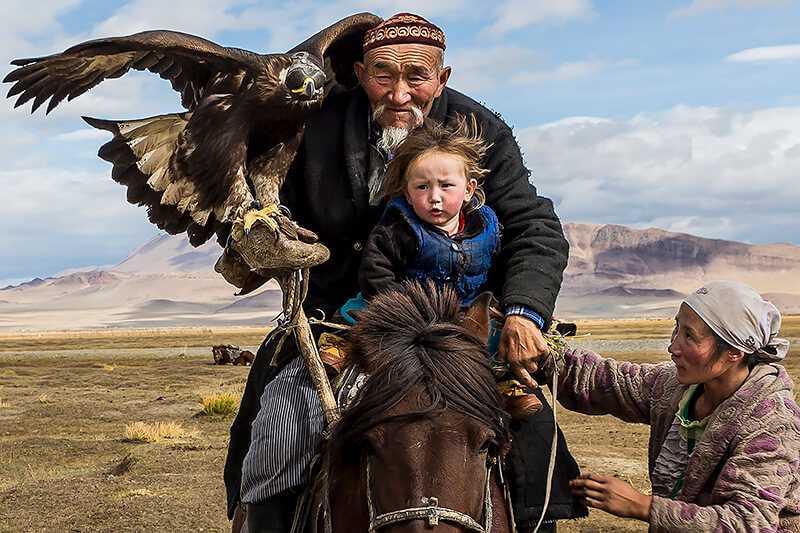
© Tariq Zaidi - All Secure, Mongolia
A woman makes sure that her child; the eagle hunter’s grandson is safely secure. Mongolia.
Western Mongolia is one of the least densely populated places on the planet. Surrounded by glacier-wrapped mountains, arid plains, barely any trees and temperatures which fall below -40C, life can be brutally hard for the nomadic families who make their homes and tend their cattle here.
Do you spend a lot a time editing your images? Is your choice influenced by the agencies that represent you?
My work cycle is as follows...
I research in detail where I want to go and what I want to try and get from the trip – this usually takes me around 2-3 weeks to do. Then, I go to the location for between 10-20 days to try to make a story. I spend around 1-2 weeks editing the images to get a strong selection of images which come together and tell the narrative I want to show. And then maybe spend around a week writing the complete story to send to potential publishers.
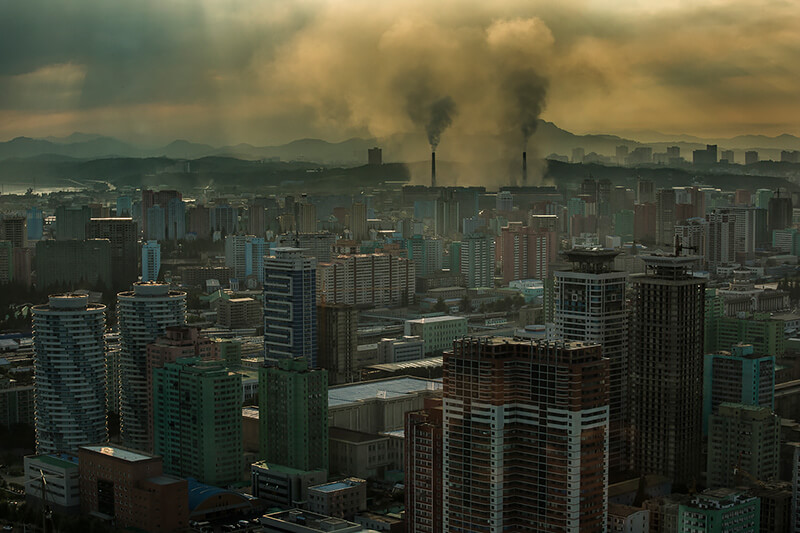
© Tariq Zaidi - Pyongyang City View, North Korea
Pyongyang city view taken from the Yanggakdo International Hotel. North Korea.
I have many mentors and many favorite photographers but the 2 who I keep coming back to me are:
On the travel side I recommend Sebastian Salgado, a Brazilian genius. He has amazing black & white travel photography; it will blow any human being away.
The god of Documentary for me is James Nactwey. His images are iconic.
What is your best memory as a photographer? An anecdote you would like to share?
There is this one image I made. Not necessarily the most eye catching or special to a viewer but it took me 4 days of waiting to get this scene to happen.
I saw this amazing mural in the white building in Phnom Penh, Cambodia and saw many people go up and down these stairs – I loved the colors and light and would go back to the same spot again and again – on my 4th day I saw and captured what I had been waiting for – someone with the right colored top and bottom. Waiting for something special to happen over 4 days may seem a little extreme (unless you are a wildlife photographer) but when you feel you've nailed it – it does make an image special (at least for me).
What is your worst memory or challenge on the field?
I would prefer not to say as there have been many. However, when you work alone (I don't usually use a fixer or guide), in some of the most remote or hostile parts of the world things don't always go right. What I have learned is to always stay calm, be polite, stand your ground and try to work (or talk) yourself out of the situation. It seems to be working so far; having travelled to well over 100 countries.
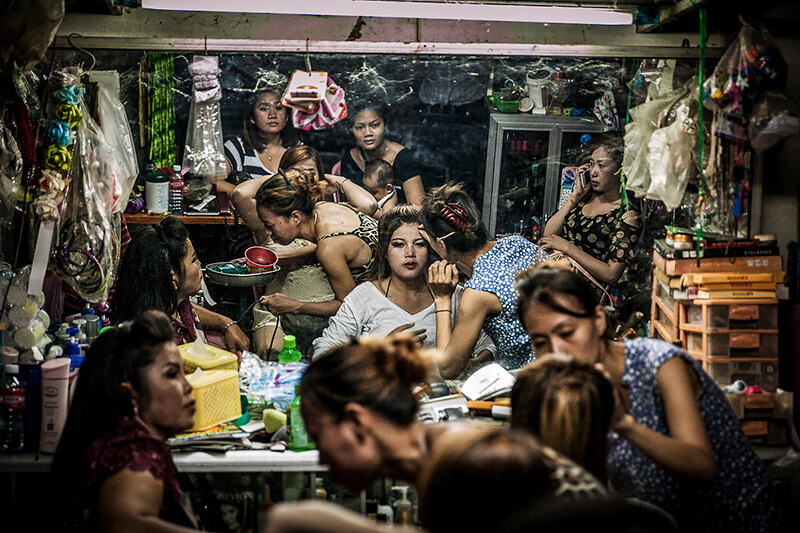
© Tariq Zaidi - Friday Night at the Hairdressers
Female residents take the opportunity to catch their breath at the end of the day and come together to socialize at the in-house beauty parlor on the ground floor of the former White Building (Bodeng as it was locally known), where many smarten up before a night out, and others prepare for work. Earlier this year (Aug 2017) the building was demolished to make way for new modern living and office spaces. Phnom Penh, Cambodia.
Have you an exhibition scheduled? A book in the making?
Yes, on both.
For my upcoming group and/or solo exhibitions – please watch this page:
Current shows where some of my work can be seen are:
Priced out of the Favela. Rio de Janeiro, Brazil, FestFoto, 8 to 12 May 2018, Porto Alegre, BRAZIL
Sapeurs of Brazzaville. A Portrait Series, Maksem Cumhuriyet Art Gallery Taksim, 4 to 15 May 2018, Istanbul, TURKEY
Head On Photo Festival, 5 to 20 May 2018, Sydney, AUSTRALIA
ICA Gallery, 12 to 16 May 2018, Tokyo, JAPAN
Charles H. Wright Museum of African American History, 20 May to 26 Dec 2018, Detroit, USA
Siena International Photo Awards Exhibition, 28 Oct to 2 Dec 2018, Siena, ITALY
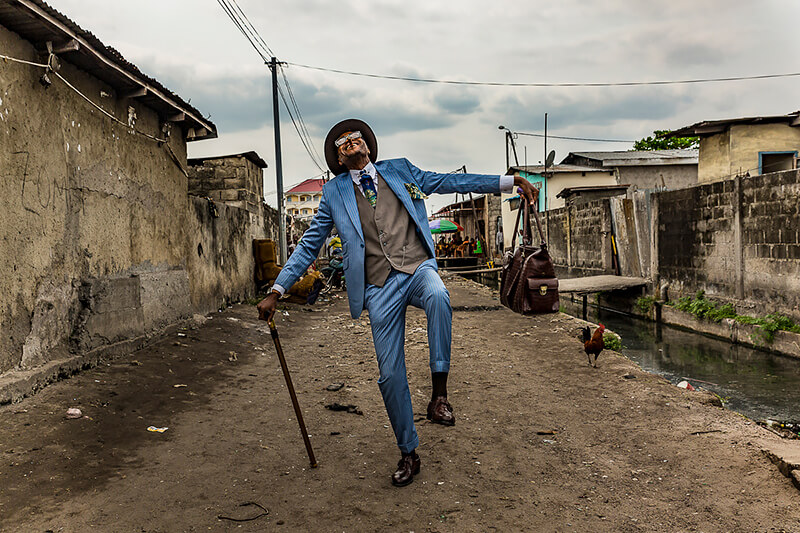
© Tariq Zaidi - The Sapeur of Brazzaville
Elie, 45, struts' his stuff in the streets of Brazzaville. He has been a sapeur for 35 years and his elaborate outfits bring joy to himself and his community. Brazzaville, Republic of the Congo. La Sape, an abbreviation of Société des Ambianceurs et des Personnes Élégantes (Society of Ambiance-Makers and Elegant People), is a subculture centered on the cities of Kinshasa and Brazzaville in the DRC and Republic of Congo. Someone who follows La Sape is known as a Sapeur.
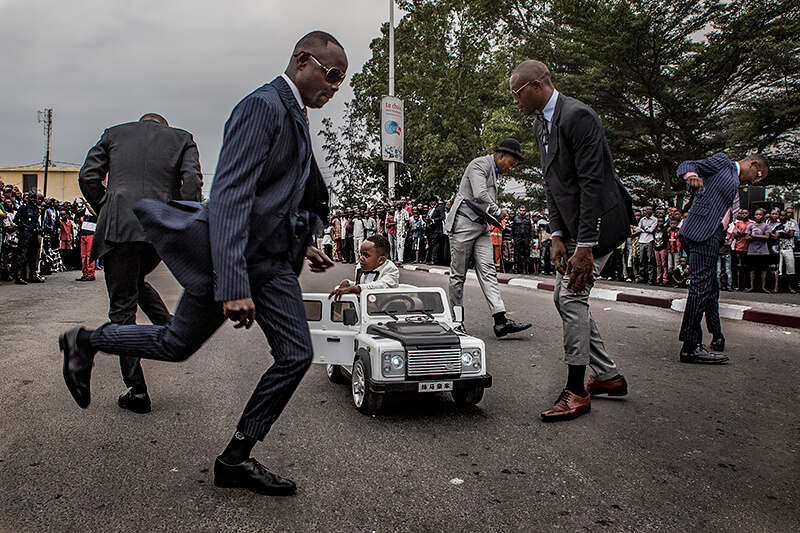
© Tariq Zaidi - Sapeur Festival
Boy sapeur gets out of his mini electric car surrounded by other sapeurs. Sapeur Festival, Brazzaville, Republic of the Congo. La Sape, an abbreviation of Société des Ambianceurs et des Personnes Élégantes (Society of Ambiance-Makers and Elegant People), is a subculture centered on the cities of Kinshasa and Brazzaville in the DRC and Republic of Congo. Someone who follows La Sape is known as a Sapeur.
What advice would you give someone who would like to become a photojournalist today?
You need to research. What has already been done, what are you going to do differently, what are you going to do better. I spend a hell of a lot of time researching what is out there already. Either about the countries, the people or the subject matter I want to tackle. You need to plan your trip well, logistically, factors like is someone going to help you, do you have enough money, who are you going to meet with, who would you like to meet with, what story do you want to tell. Everything will most probably change when you are there, but it's good to have a thought, an idea, a dream in your mind before you even start. One of the most important things is whatever you do, you have to be humble to the people you are working with, no judgment ever. If you are humble and respectful they will allow you to get closer to them, closer into their lives. That is where amazing images come from.
There is a quote by Ansel Adams – 'Photographers don't take photographs, they make photographs'. A lot of time is spent waiting. I don't tell somebody 'why don't you walk across there and stand right in the middle of those two cows'. That's not my practice. I wait for it to happen and that sucks, because it may happen or it may not happen. But, when it does happen you think to yourself that I absolutely nailed it. A lot of time is spent waiting for the right moment. You need to know what you want to happen. Making a photograph is about seeing something and having an image in your head and then running around to get the right position, light, components to make it happen.
You really do not need lots of equipment. I basically use one body (Canon 5D III) and one 24-70mm lens, that's pretty much it. To give you an idea, my total stuff that I take on a trip for a month, clothes, sleeping bag, camera, lenses, batteries, laptop weighs less than 10kg. If you want to take a good photograph it's about the moment, it's about the light, it's about something special. It's got nothing to do with your equipment.
The other thing I would say is study the masters, there are lots of them. A good place to start are the Magnum photographers. The older photographers are quite remarkable, there is so much to learn from them. Another thing is when you're working on a project and it's just not happening and you are not happy with you images, don't give up. The next day will be better or maybe something amazing happens right in front of you.
If you are doing a photo-story, then you need to keep going back and stay around for a long time to develop that relationship with communities and places. When you have your set of 50-100 images that you absolutely love about the story that you want to tell, find an editor to have a look at the images with you. One thing myself and a lot of my colleagues do is get too involved with the photographs. Too involved with the story, rightly so. They are the only one who can say this doesn't fit, this is rubbish. You have to get an editor to help you cut it down to 20 or so images that you can send out and hopefully get published or printed. It's very important and a big lesson that I have learned in the last four years.
Pamela, 16, with her 7-month old daughter; lives in an occupied squat of around 100 families. ‘Favela’ Mangueira community, Rio de Janeiro, Brazil. Around 2 million people, or approximately 30 percent of Rio's population (6.45 million), reside in ‘favela’ communities which often lack proper sanitation, education, security or healthcare
Is there anything else you would like to add?
I would recommend that people look at the winners of the Photographer of the Year competition and the World Press Photo competition. You can learn a lot from them, you can get inspired. I also recommend the Time Magazine 'Lightbox' and the New York Times 'Lens Blog', both have amazing storytelling from around the world.
But most importantly, keep it personal, keep it honest and keep it you.
Thank you Tariq for your time, for your commitment to capture the dignity and the soul of the people you photograph. You certainly managed to that in the images you submitted to All About Photo. From myself and the other jurors, we wish you all the best and hope to see more of your amazing work in a near future.
You can see more of Tariq's work on his @tariqzaidiphoto and his website
More about Tariq Zaidi on All About Photo
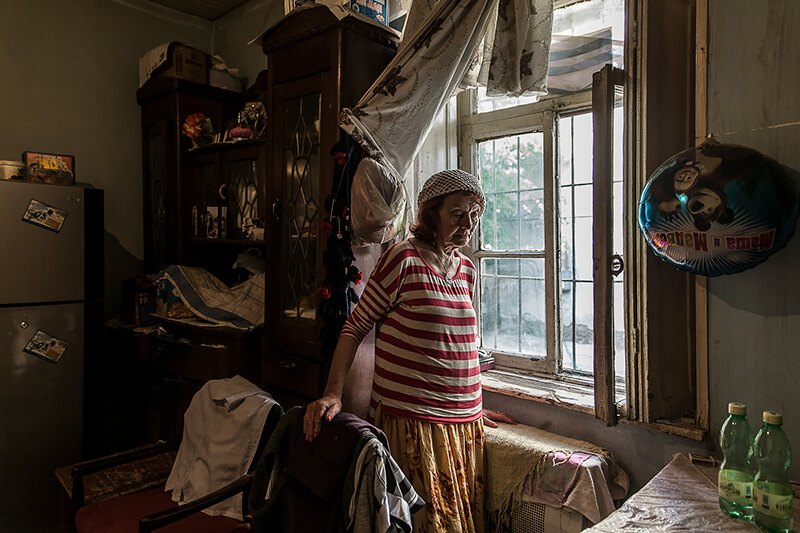
© Tariq Zaidi - Lena. Tbilisi, Georgia
Lena once lived all over Eastern Europe trying to escape the Nazis. She remembers queueing with her mother all night to get one loaf of bread. She eventually arrived Georgia in 1975, and worked as a tailor for 30 years. After the death of her husband and the emigration of her daughter, she now lives alone in Tbilisi, Georgia.
